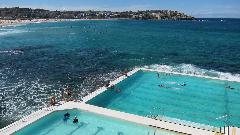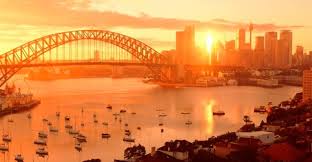Education in Australia – not just for Aboriginal people (part 1)
 Russian students have recently discovered Australian education. But last year, about a hundred Russians left to study in Australia, and over thirty in the first four months of this year. Schools, colleges, universities in Australia are attractive not only because they are in one of the most exotic countries on the planet. Just an Australian education, which, by the way, is built like the British, is really appreciated all over the world.
Russian students have recently discovered Australian education. But last year, about a hundred Russians left to study in Australia, and over thirty in the first four months of this year. Schools, colleges, universities in Australia are attractive not only because they are in one of the most exotic countries on the planet. Just an Australian education, which, by the way, is built like the British, is really appreciated all over the world.
The academic year in Australian schools begins in February, and in universities in March. So if you want to start studying next year, now is the time to start correspondence and prepare for admission.
Private schools are more expensive but better
It can be said that a carefree childhood ends in Australians as early as 4-5 years old – from this age compulsory education begins in kindergartens. Further “eradication of illiteracy” continues in the so-called children’s school (infants school) – this is another four years. Moreover, in Australia, they believe that all this time children do not so much study as they “warm up” before serious schooling.
Serious studies begin in primary school – these are 5-6 years of study. The list of compulsory subjects in different Australian schools depends on the program, but usually it is English and mathematics. Art, literature, geography, the basics of nature sciences, other foreign languages are added by choice.
A graduate of elementary school is already halfway to secondary education. Up to this point, there is nothing left – some six years of study in high school – from grades 7 to 12. In principle, those who are tired of studying can finish it after the 10th grade – then they will have to pass an exam to receive a certificate of incomplete secondary education (School Certificate). You cannot go to university with this document, but you can continue to study in college.
The hardest part starts in grades 11 and 12. Students should choose five core subjects for which they will later take final exams. Naturally, while studying, knowledge is also evaluated, and in a rather unusual way. Firstly, according to the results of each semester, students receive written feedback from each teacher. In addition, the teacher gives the student a mark (a maximum score of 100) and indicates the average grade in the class. So you can always see in what subjects the child needs to “catch up.”
Final exams in the 12th grade – written tests. After them, graduates receive a certificate of secondary education (High School Certificate). It indicates the average student grade – TER (tertiary education ranking). This assessment serves as a kind of passing score in Australian universities.
Australia has public and private primary and secondary schools. In public education is free, and they study mainly locals. Studying in private schools costs foreigners $$ 6.000-8.000 per year (hereinafter, prices are in Australian dollars. 1 American dollar is 1.27 Australian dollars).
There are mixed (for students of both sexes – Co-educational) and separate (Single) private schools. As in the same Great Britain and in some other countries of Western Europe, the latter are considered especially prestigious. For example, in a private closed school for boys, Scotts College children are enrolled immediately after their birth.
Vocational education: less theory
Students who say goodbye to school after grade 10 have a direct road to private or state colleges, or to technical institutes (they can be compared with a stretch to our vocational schools or technical schools). If the training lasts from 12 to 30 weeks, a certificate of assignment of a profession is awarded, and if more than 40 weeks, then a diploma. After that, you can go to university or go to work.
There are dozens of private colleges in Australia. It is better to enter those that are accredited by the state organization NFROT (National Framework for the Recognition of Training). Some courses in private colleges also have accreditation of professional and industrial associations – and this is an additional guarantee that at the end of the courses you will be able to find work in a specialty.
For admission to private colleges, you usually need to pass an interview and tests. It is advisable to have at least minimal work experience.
The most difficult thing is to enter music, art, theater colleges. For admission to them, you need, first of all, talent, and
In Australia, there are 250 state technical and further education colleges (TAFE) colleges. TAFE colleges are very popular with both Australians and foreigners: training in them is more focused on practice than theory. TAFE courses are quite omnivorous – they teach tourism, hotel management, provide knowledge on land and sea resources and on other specialties that are generally scarce in the labor market. The longer the program, the more “serious” is the document about the education received. After 2-3 years of study, the student receives an Advanced Diploma, which is equivalent to documents on higher education in some university majors. Graduates of 1.5-2 year courses receive the regular, non-advanced Diploma. And if the training lasts from 1 to 1.5 years, then after it is awarded Certificate Level 1-4.
Studying at TAFE colleges, depending on the duration and content of the courses, costs from $ 2,000 per year.
Almost all Australian colleges offer intensive English courses for international students (ELICOS – English Language Intensive Courses for Overseas Students). It makes sense for Russian students to learn from them before entering college or university. Courses last from 2 to 40 weeks, the cost of training is from $ 200 per week.
Australian version of British universities
The first universities appeared in Australia in the middle of the last century. Now there are 40 of them. Depending on the specialty, training in them lasts from 3 to 5 years, and upon graduation, students receive a bachelor’s degree (Bachelor). Universities also offer courses for obtaining Master and Doctoral degrees, although not at all faculties. Australia’s highest degree is doctoral (PhD).
It is best taught here in such specialties as social sciences, theology, tourism, agriculture. However, the competitions for these faculties are small, since their graduates receive relatively low salaries.
Another thing is computer, engineering, medical, veterinary and physical and mathematical faculties. The probability of finding a highly paid job after them is quite high. For example, the starting salary of graduates of the Faculty of Dentistry is an average of $ 41.600 per year. For comparison: theologians receive approximately $ 21.200.
It is curious that not these faculties are especially popular among foreigners, but those related to business. Last year, 7.760 studied in different universities in Australia, with a specialty in Business and Trade and 4.058 foreigners studying Management.
A list of leading universities is provided on the next page of this issue of “i”. As can be seen from the table, different branches of one university can vary greatly in such indicators as the level of education, the salary of graduates, and so on.
Studying at Australian universities is quite expensive – from $ 8.000 (at the faculties of religion and theology) to $ 25.000 (faculties of medicine, dentistry and veterinary medicine) per year. Studying in business specialties costs from $ 10,000 to $ 12,000. Australians, as well as foreign students from some countries of the Pacific region, can rely on scholarships, but Russians, as a rule, pay the full tuition. A small chance of getting a scholarship – but only with outstanding abilities – is given to Russians entering an Australian graduate school or doctoral program.
Universities include a green light for Australian citizens – they don’t need to take entrance exams. It is enough to have good grades in the certificate of secondary education. Each university has its own estimated requirements. For example, for admission to the prestigious Department of Commerce of the University of South Wells, the TER must be at least 92, and the Department of Art – 76 points.
If TER does not “reach” the required level, Australians study at university preparatory courses (from 9 to 12 months, foreigners are also accepted here). They are taught in 4 areas: applied sciences, humanities and natural sciences, commerce and social sciences, and visual arts.
What to do and where to live
also a special set of documents (each college has its own) and high marks in the certificate.
Those who are short of money can go to technical institutes (Technical Institutions, or TECHS). Partially they are funded by the state, so studying in them is cheaper than at universities or private colleges. You can study at institutes from 8 months (typewriting) to 3 years (business courses). Upon receipt, the grades in the certificate do not matter much: the main thing is to have time to send documents and reserve a place.




